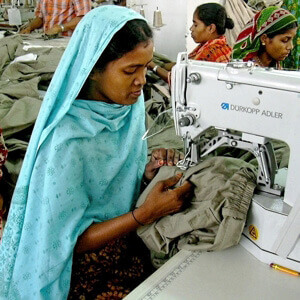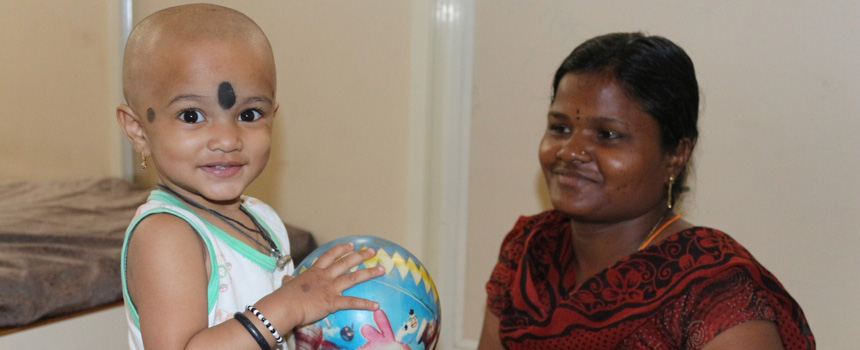 Child care instead of child labour
Child care instead of child labour
Wholesome food for children of garment workers in Bangladesh
Bangladesh is ten hours by plane from us. But the country is also closer to us than most others: Every day, we wear clothing that was produced in Bangladesh. Every day, millions of women garment workers produce for us T-shirts, dresses and trousers from Bangladesh. These days, many people also know that the majority of these garments are produced under very bad working conditions. Garment workers usually spend seven days per week and up to 12 hours per day working at the factory. Many of them have small children. But rarely does anyone think about how these children are cared for while the workers are at the factory. “Free day care for the women garment workers is a good way to prevent child labour. I myself started working in the garment industry when I was 12,” Kalpona Akter of the Bangladesh Centre for Workers Solidarity says. “Our day care centre gives the children the possibility to develop freely and to take a different path in their lives.”
Necessity
Food for children of garment workers in a day care centre in Bangladesh.
Activity
A local NGO buys food and produces 3 meals per day for the children at the centre.
Countable effort
Number of meals that will have been handed out to the children.
Result
This measure will feed 20 children per day.
Systemic effect
Improved health as well as educational opportunities for school-aged children of garment workers.
Background
In Bangladesh, four million people work in the garment industry in order to earn a living for themselves and their families. About 80 percent of the workers in the industry are women (Kampagne für saubere Kleidung, 2018). The Bangladeshi government has set a minimum salary of about 52 euros per month. However, this has not been raised in the last five years. Here in Germany, the unions regularly fight for the adjustment of salaries in collective negotiations. In Bangladesh, the unions are much less influential. The regular salary is no longer sufficient to feed a family.
In order to do that, many garment workers often have to work a lot of overtime. 100 hours of overtime per month are not uncommon. And the lack of day care facilities thus poses challenges for these working mothers and fathers. If they do not have the financial means to not work so much, that means that even very small children have to stay at home unsupervised or have to be cared for by older siblings, who in turn have to neglect their school education. If the children stay at home, they are then also roped into working from home, such as to help in sewing on sequin. That leaves them with no way to concentrate on their education.
The good deed
To allow the children of garment workers to be taken care of in an age-appropriate way, the Bangladesh Centre for Workers Solidarity runs a free day care centre. Today’s good deed covers the care for these children. They are provided with three wholesome meals and clean drinking water. This creates the foundation for a healthy development from earliest childhood. Primary school children also come to the day care facility after school. To be able to concentrate on learning at all, they also need the regular meals. Daily sustenance helps to improve the health of these children. This also provides relief for the working parents – both financial and from having to worry about if their children are safe and well taken care of. At the same time, FEMNET e.V. supports local labour unions and conducts campaigns to raise awareness of the issue of fair garments in Germany.

AboutBangladesh
Dhaka
Capital
164 800 000
Number of inhabitants
3.611
Gross domestic product per capita per year
136
Human Development Index
After China, Bangladesh is the largest exporter of garments. More than four million workers, mostly women, have to try to make a living by working in the garment industry.
About the organization and further information
Association
FEMNET e.V.
Website
Initiative Transparente Zivilgesellschaft
Further information and source
- Kampagne für Saubere Kleidung, 2018. Bangladesch Länderinformationen.
- Cividep, 2015. Bedarfsanalyse über Kinderbetreuungseinrichtungen in der Bekleidungsindustrie in Bangalore, Bangalore, Indien.
- FEMNET, 2017. FEMNET Fact Sheet Kinderbetreuung, Bonn.
- Kampagne für Saubere Kleidung, 2018. Bangladesch Länderinformationen.
- Cividep, 2015. Bedarfsanalyse über Kinderbetreuungseinrichtungen in der Bekleidungsindustrie in Bangalore, Bangalore, Indien.
- FEMNET, 2017. FEMNET Fact Sheet Kinderbetreuung, Bonn.




